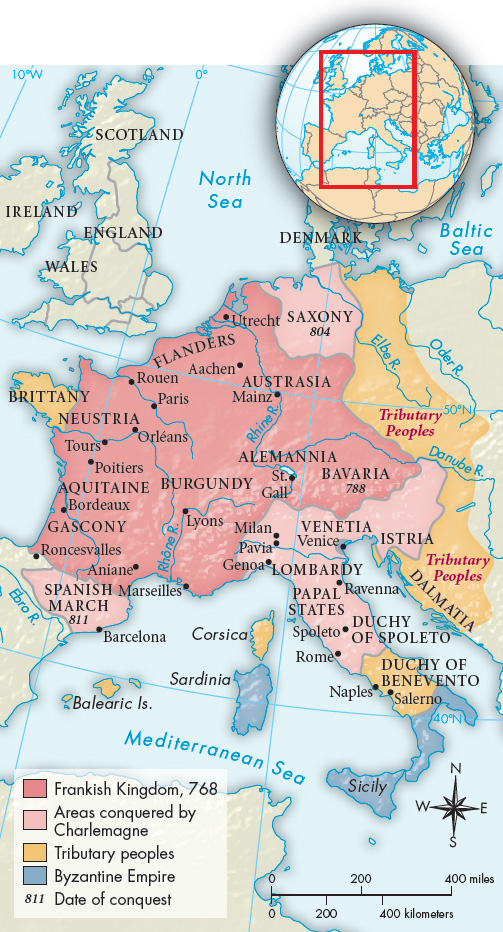The Warrior-Ruler Charlemagne

Charlemagne’s adviser and friend Alcuin (ca. 735–804; see page 237) wrote that “a king should be strong against his enemies, humble to Christians, feared by pagans, loved by the poor and judicious in counsel and maintaining justice.”3 Charlemagne worked to realize that ideal in all its aspects. Through brutal military expeditions that brought wealth — lands, booty, slaves, and tribute — and by peaceful travel, personal appearances, and the sheer force of his personality, Charlemagne sought to awe newly conquered peoples and rebellious domestic enemies.
If an ideal king was “strong against his enemies” and “feared by pagans,” Charlemagne more than met the standard. In continuing the expansionist policies of his ancestors, his reign was characterized by constant warfare; according to the chroniclers of the time, only seven years between 714 and 814 were peaceful. Charlemagne fought more than fifty campaigns and became the greatest warrior of the early Middle Ages. He subdued all of the north of modern France, but his greatest successes were in today’s Germany, where he fought battles he justified as spreading Christianity to pagan peoples. In the course of a bloody thirty-year war against the Saxons, he added most of the northwestern German peoples to the Frankish kingdom. In his biography of the ruler, Charlemagne’s royal secretary Einhard reported that Charlemagne ordered more than four thousand Saxons killed on one day and deported thousands more. Those who surrendered were forced to become Christian, often in mass baptisms. He established bishoprics in areas he had conquered, so church officials and church institutions became important means of imposing Frankish rule.
Charlemagne also achieved spectacular results in the south, incorporating Lombardy into the Frankish kingdom. He ended Bavarian independence and defeated the nomadic Avars, opening eastern Germany for later settlement by Franks. He successfully fought the Byzantine Empire for Venetia, Istria, and Dalmatia and temporarily annexed those areas to his kingdom. Charlemagne’s only defeat came at the hands of the Basques of northwestern Spain. By around 805 the Frankish kingdom included all of northwestern Europe except Scandinavia and Britain (Map 8.2). Not since the Roman emperors of the third century C.E. had any ruler controlled so much of the Western world. Other than brief periods under Napoleon and Hitler, Europe would never again see as large a unified state as it had under Charlemagne, which is one reason he has become an important symbol of European unity in the twenty-first century.